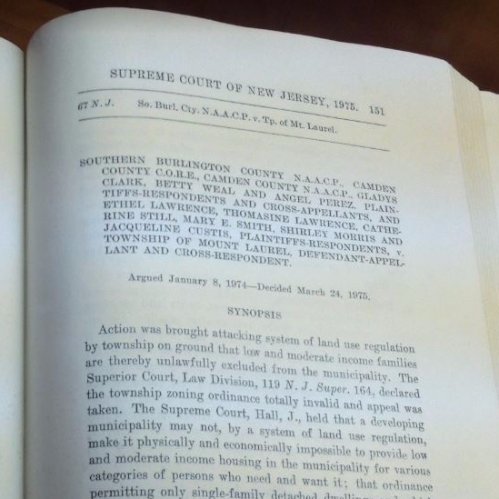The New Jersey Senate is considering legislation that would amend the Local Redevelopment and Housing Law (LRHL) to reflect the clarified blight prerequisite from the Gallenthin decision, and also to incorporate a response to the due process concerns that were raised in the DeRose case.
♦ S-2447 would rewrite the ambiguous language of 40A:12A-5(e) to clarify the blight requirement for takings.
The statute presently reads:
(e) A growing lack or total lack of proper utilization of areas caused by the condition of the title, diverse ownership of the real property therein or other conditions, resulting in a stagnant or not fully productive condition of land potentially useful and valuable for contributing to and serving the public health, safety and welfare.
Post amendment, it would read:
(e) A growing lack or total lack of proper utilization of areas caused by the condition of the title, diverse ownership of the real properties therein or other similar conditions which impede land assemblage or discourage the undertaking of improvements, resulting in a stagnant and unproductive condition of land potentially useful and valuable for contributing to and serving the public health, safety and welfare, which condition is presumed to be having a negative social or economic impact or otherwise being detrimental to the safety, health, morals, or welfare of the surrounding area or the community in general.
♦ The bill would create two distinct classes of redevelopment areas: condemnation and non-condemnation. Councils would be required to choose a class when directing their planning boards to investigate the potential for redevelopment among certain parcels, and future actions would be limited by their choices.
♦ The bill would strengthen the requirements for noticing property owners in potential redevelopment areas, particularly with regard to eminent domain in proposed condemnation redevelopment areas.
The bill is sponsored by two Democrats, Jeff Van Drew (Cape May) and Ron Rice (Essex). S-2447 cleared the Community and Urban Affairs committee with unanimous support (5-0) earlier this month. If you’re interested in how the states are tackling eminent domain issues in the post-Kelo landscape, then the markup is worth a look.
Read Full Post »


 I created a new list (below, right column) of New Jersey legal research resources. These may be helpful for pro se projects, and also just for anyone who likes having access to the whole body of state law from one simple list. People seem happily surprised to learn that the Rutgers Law Library has a free statutes annotated resource, which allows you to discover court decisions that have cited and/or interpreted a particular section of law. The MOD-IV is also an indispensable resource for anyone challenging a property tax assessment, or engaging in real estate sales research.
I created a new list (below, right column) of New Jersey legal research resources. These may be helpful for pro se projects, and also just for anyone who likes having access to the whole body of state law from one simple list. People seem happily surprised to learn that the Rutgers Law Library has a free statutes annotated resource, which allows you to discover court decisions that have cited and/or interpreted a particular section of law. The MOD-IV is also an indispensable resource for anyone challenging a property tax assessment, or engaging in real estate sales research.
 There was one published decision on land use in the New Jersey appellate courts this week. Motley v. Borough of Seaside Park Z.B.A. addressed the question of destruction, as used in
There was one published decision on land use in the New Jersey appellate courts this week. Motley v. Borough of Seaside Park Z.B.A. addressed the question of destruction, as used in
You must be logged in to post a comment.